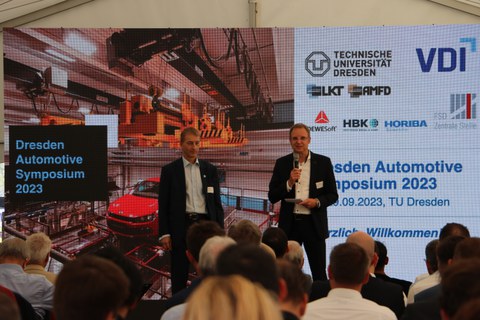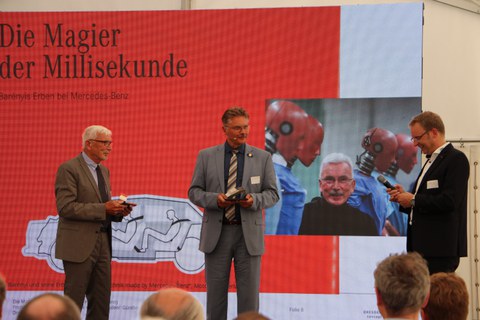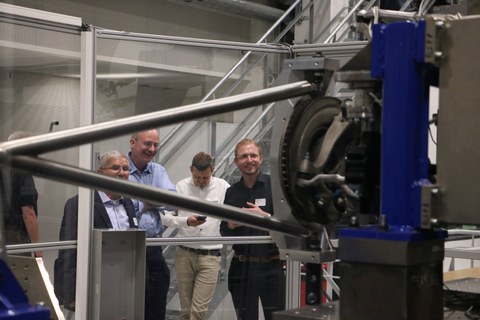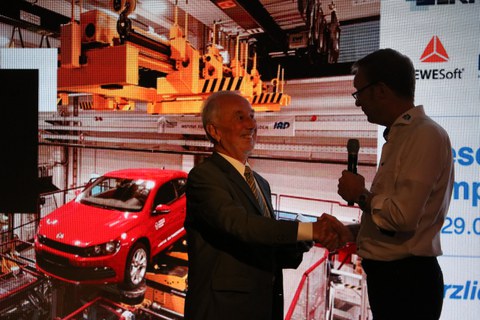Oct 11, 2023
Review of the Dresden Automotive Symposium 2023

Uwe Bastian and Professor Günther Prokop moderated and led through the event
The first Dresden Automotive Symposium took place on 28 and 29 September 2023. Over two eventful days, 160 guests and colleagues from the Department of Automobile Engineering at TU Dresden (LKT) looked back on 120 years of automotive engineering in Dresden. As part of this event organised with the Association of German Engineers (VDI), the Vehicle Test Centre (FVZ) and the highly immersive driving simulator of the TU Dresden were presented to a wide audience of experts.
The event was hosted by Professor Günther Prokop and Uwe Bastian from the VDI. The guests were offered technical presentations from all areas of automotive technology, from engine development in Formula 1 to highly automated driving functions. Professor Prokop did not miss the opportunity to present the Smart Mobility Lab (SML) and all the associated possibilities to the guests. The SML is a research project that will create a research infrastructure in Hoyerswerda by 2026 that will enable combined research into "automated and cooperative driving, flying and robotics as a technological super-accelerator for the mobility of tomorrow".

Karl-Heinz Baumann and Professor Rodolfo Schöneburg are honoured by Professor Günther Prokop for their many years of teaching on integral vehicle safety at the TU and HTW Dresden
A first highlight of the event was the honouring of Professor Rodolfo Schöneburg and Karl-Heinz Baumann for their many years of teaching Integral Vehicle Safety at the TU Dresden and HTW Dresden. For 14 years, both were able to bring current topics in vehicle safety closer to the students of vehicle technology in theory and practice. One highlight was the annual excursion of all students to the Mercedes-Benz Vehicle Safety Technology Centre. Among other things, the students were able to directly experience the importance of vehicle safety through the demonstration of a crash test.

Guests are guided through the FVZ
After the presentations, the guests were given a guided tour of the FVZ. There was the opportunity to talk to the scientific staff of the chair and to have all aspects and details of the FVZ explained to them. With the FVZ, the TU Dresden and the Chair of Automobile Technology have gained an infrastructure that is unique in the university landscape and offers all the possibilities for research into the physics of driving. With the FVZ, models can be developed, parameterised and validated from the component to the full vehicle. Such models are essential in the virtual development process of the automotive industry, for the development of new and innovative vehicle inspection methods or for the development of highly and partially automated driving functions.
At the end of the first day, as a further highlight, Professor Horst Brunner was honoured for his services to automotive engineering at the Dresden location and for his life's work. Professor Horst Brunner held the Chair of Automobile Engineering at the TU Dresden from 1991 to 2005 and during this time laid the foundation for the successful development of the chair after 1990. In his speech, Professor Brunner addressed the difficult period of change after 1990 and expressed his pride in the current developments of the chair.

Professor Horst Brunner is honoured for his life's achievements
Friday was all about the highly immersive driving simulator. After presentations on the concept and technology of the driving simulator, all guests were able to experience the driving simulator in motion with their own eyes. With the highly immersive driving simulator, it will be possible in the near future to build, parameterise and validate models of the human driver. This will open up new possibilities for the development of highly and partially automated driving functions.
The Chair of Automobile Engineering would like to thank all the speakers, guests and staff who made this event such a great success.
